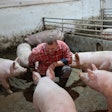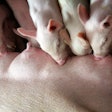
A California court has extended by six months the time during which whole pork meat that does not comply with Proposition 12 and is already in the supply chain can be sold.
The implementation date for Prop 12 enforcement has been modified from July 1 to December 31.
The Superior Court for the County of Sacramento issued the order further modifying certain aspects of the implementation schedule for California Proposition 12 on June 16, but did not release the order until June 21. The order does not delay the underlying requirements of Prop 12; any pork harvested after July 1 to be sold in California will still have to be compliant with Proposition 12.
Under the terms of the order, non-compliant whole pork meat can continue to be sold in California provided that:
- As of July 1, is in the possession of an “end user” or a “pork distributor” or on the premises of an establishment at which mandatory inspection is provided under the Federal Meat Inspection Act and that holds an establishment number granted by the Food Safety Inspection Service of the United States Department of Agriculture
- Is self-certified by the end user, pork distributor, or other federally inspected entity to have been in their possession or was in the possession of another end user, pork distributor, or other federally inspected entity as of July 1, 2023
- Is ultimately sold, transferred, exported or donated on or before December 31, 2023
“It is welcome news to America’s pig farmers and consumers that California recognized the challenging situation the July 1 Proposition 12 implementation date will have on our industry and food supply. Granting six months of additional relief for products in the supply chain allows grocery stores to remain stocked so the 40 million Californians have uninterrupted access to affordable, safe and nutritious pork products, especially with rising food prices,” said National Pork Producers Council (NPPC) CEO Bryan Humphreys in a statement. “While this temporary solution does not solve the challenges and uncertainty California Proposition 12 brings to our industry, NPPC looks forward to working with Congress to find a permanent solution to this problem.”
The Exposing Agricultural Trade Suppression Act, introduced in the U.S. House of Representatives and the U.S. Senate in August 2021, would restrict state and local governments from imposing certain standards or conditions on the production or manufacture of agricultural products sold or offered for sale in interstate commerce.
A U.S. Supreme Court ruling in May upheld Prop 12, which bans the sale of pork from hogs that don’t meet certain production standards. The law, which was approved by voters in 2018, establishes minimum space requirements based on square feet for breeding pigs, veal calves and egg-laying hens, and bans the sale of meat and eggs from those animals when they are raised in a way that does not comply with the minimum requirements. According to the National Pork Producers Council (NPPC), Prop 12 prohibits the sale of pork from hogs whose sows were raised anywhere in the world in pens that do not comply with the state’s standards.
In National Pork Producers Council v. Ross, the NPPC had challenged the constitutionality of the law, saying it violates the Commerce Clause, which grants Congress the power to regulate trade among the states and restricts states from regulating commerce outside their borders, except for matters related to public health and safety.
















